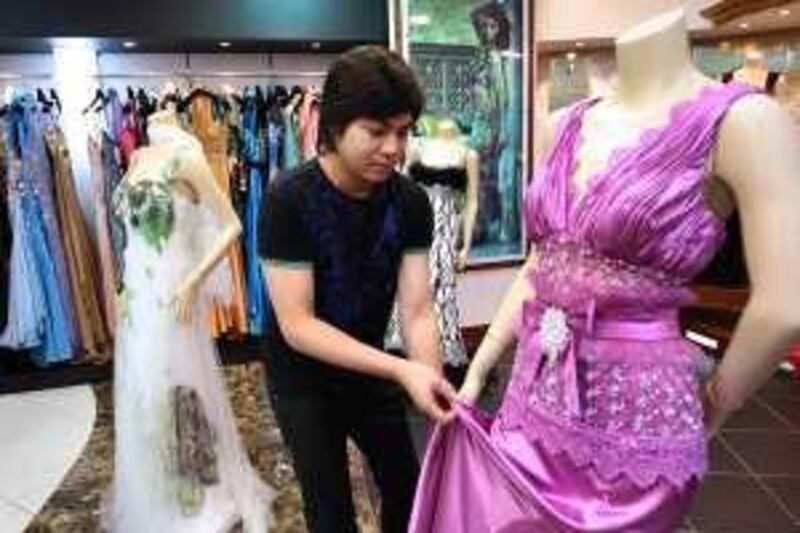SHARJAH // Working days are numbered for male staff in women's clothing stores in the emirate. With a ban just under six months away, the authorities have launched an awareness campaign telling shop owners that only women will be allowed to serve female customers from the start of next year.
The new law, which was welcomed by some Emirati women yesterday, originated at the Sharjah Economic Development Department (SEDD) and was approved in May. It comes into effect on January 1. That would give stores time to hire enough female staff and relocate displaced male staff, WAM, the state news agency, reported at the weekend. Inspections would be carried out and "strict" fines would be levied on stores found to be flouting the law, according to the department.
"This decision is very important to us, due to the privacy of women's stores and the conservative nature of Sharjah," said Khalid Saif Ibrahim, from the control and commercial protection section. "The SEDD will follow this procedure closely to ensure the application of this significant step." The SEDD said the move had been made to protect and promote the Islamic culture, which was central to Sharjah's traditions.
"Our society has always been proud of its respect for women, and is keen on giving them privacy that is on par with Islamic teachings and that grants them protection against the numerous dangers they might face," said Nawal Abdul Razzaq Askar, manager of economic and public relations at the SEDD. According to the WAM report, under the new law some shops will be able to retain selected male staff, while others will have to become all-female. It did not specify the clothing stores that would be targeted, whether the law would affect stores that offer men's apparel along with women's, or if women's shoes or jewellery shops would also see an impact.
Several attempts to reach the SEDD for clarification on specifics of the law, to confirm fines for violators, and assess the number of men and stores the change would affect were unsuccessful. Men working at some of Sharjah Mega Mall's women's shops - many of them abaya outlets - were confused by the new law yesterday, wondering why it was necessary as no woman had complained about their presence.
Wael Haddad Ramadan, an employee at Al Motahajiba, an abaya store, was one of five men at the shop who would be affected. "We have never had any problems here, and none of the women have complained," he said. "We don't touch the customer. She tells me her size, I give it to her, and if it needs adjusting, I am trained to see from where I am standing how many inches I need to change it by. I then take it from her and do the measurements on the counter, not on the woman."
Gerald Garces, 24, a sales assistant, said women frequently asked his opinion on how clothes looked. "We are in modern times now, so it shouldn't be a problem having male assistants in women's clothing stores." Mr Garces said shops needed male assistants for "heavy lifting", to carry in boxes from new shipments and arrange mannequins or displays. He was also worried about how the change would affect his family back in the Philippines.
"I feel very, very sad about this," he said. "To me it doesn't really matter where I work, but I need to work, because I need to send the money back to my country." Mr Ramadan said he would probably be transferred to one of the Dubai branches, but added: "Some of the smaller companies may have problems with this if they do not have other branches." One female shop manager felt that such a ban would protect the rights of women and result in an increase in sales to those who had previously refused to enter shops that had male shop assistants.
"Having men in women's stores, especially abaya and evening wear stores, is not a good idea," said Hanan Boully, manager of the evening gown store Julea Domani. "First because this is an Arab country, second because it follows Islam, and third because it makes us uncomfortable. "There are lot of women in the UAE who still wear the niqab and are traditional people, and their husbands will tell them not to go into a store, even an abaya store, because men are serving," she said.
"Here it is much more conservative than other Arab countries like Morocco or Lebanon." Shaima al Nuaimi, an Emirati, said she was more comfortable around female shop assistants. "I feel shy around male assistants, but around women I feel I can talk more freely, especially about certain details." One shopper, an Emirati mother from Sharjah who lives in Dubai, said she had more of an issue with men working in shoe stores than those who sold clothing.
"I'm not comfortable with guys on my feet," said Um Mahra, a 27-year-old mother of two. "Sometimes I have to lift up my abaya and they are there. I just don't like it." nsamaha@thenational.ae






